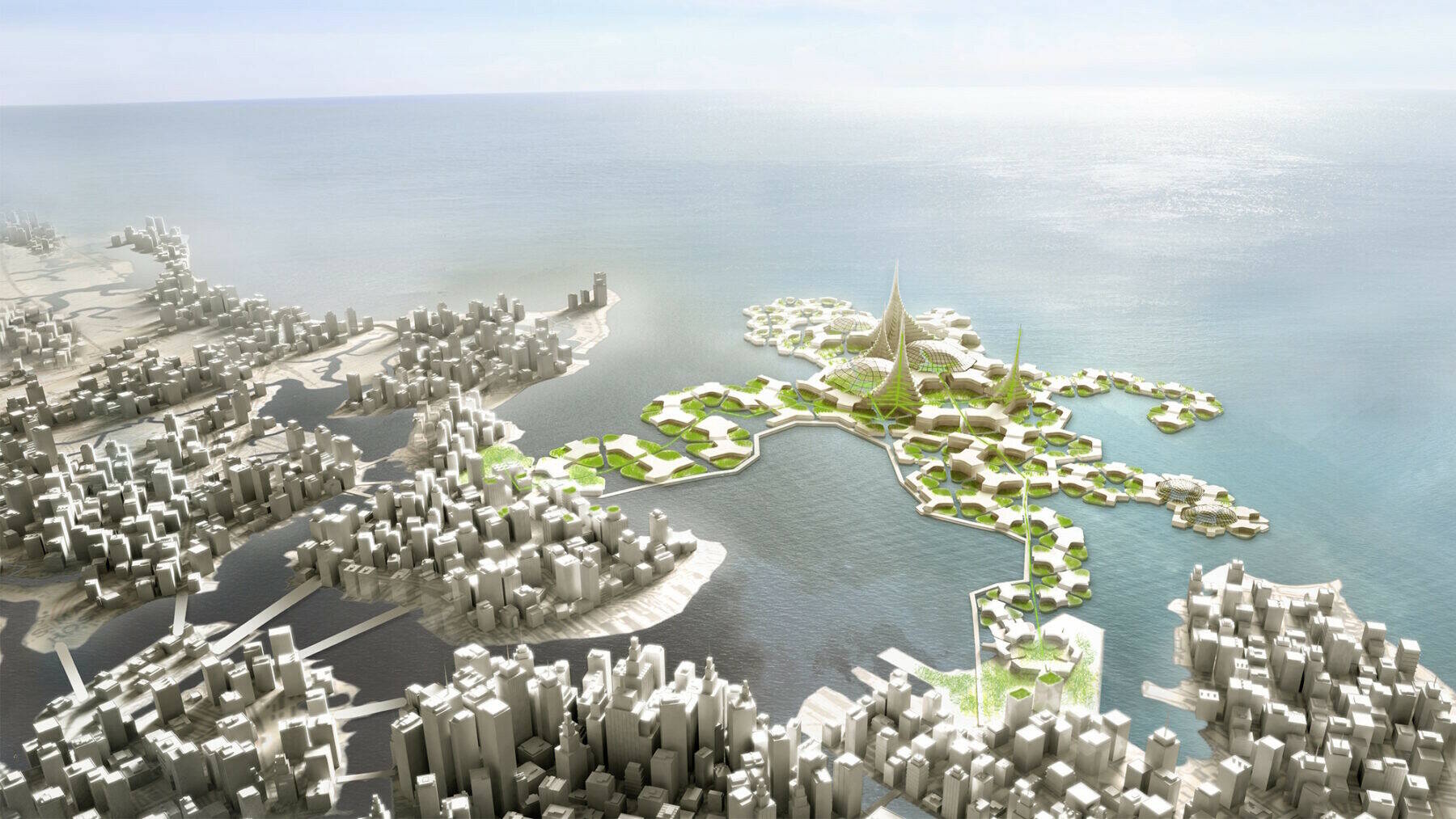



News
Carbon Collectors
Bubble curtains
Floating wind
Wind statistics
Operational advice
Floating Future
Crabbing
Cover
Dialogue Board Floating Future
More info
October 2023, no. 137
Create a MARIN account to stay updated

Report
Together with a group of partners, we have initiated the Floating Future project to better understand the pros and cons of developing floating cities and infrastructure at a larger scale.
Image Blue21
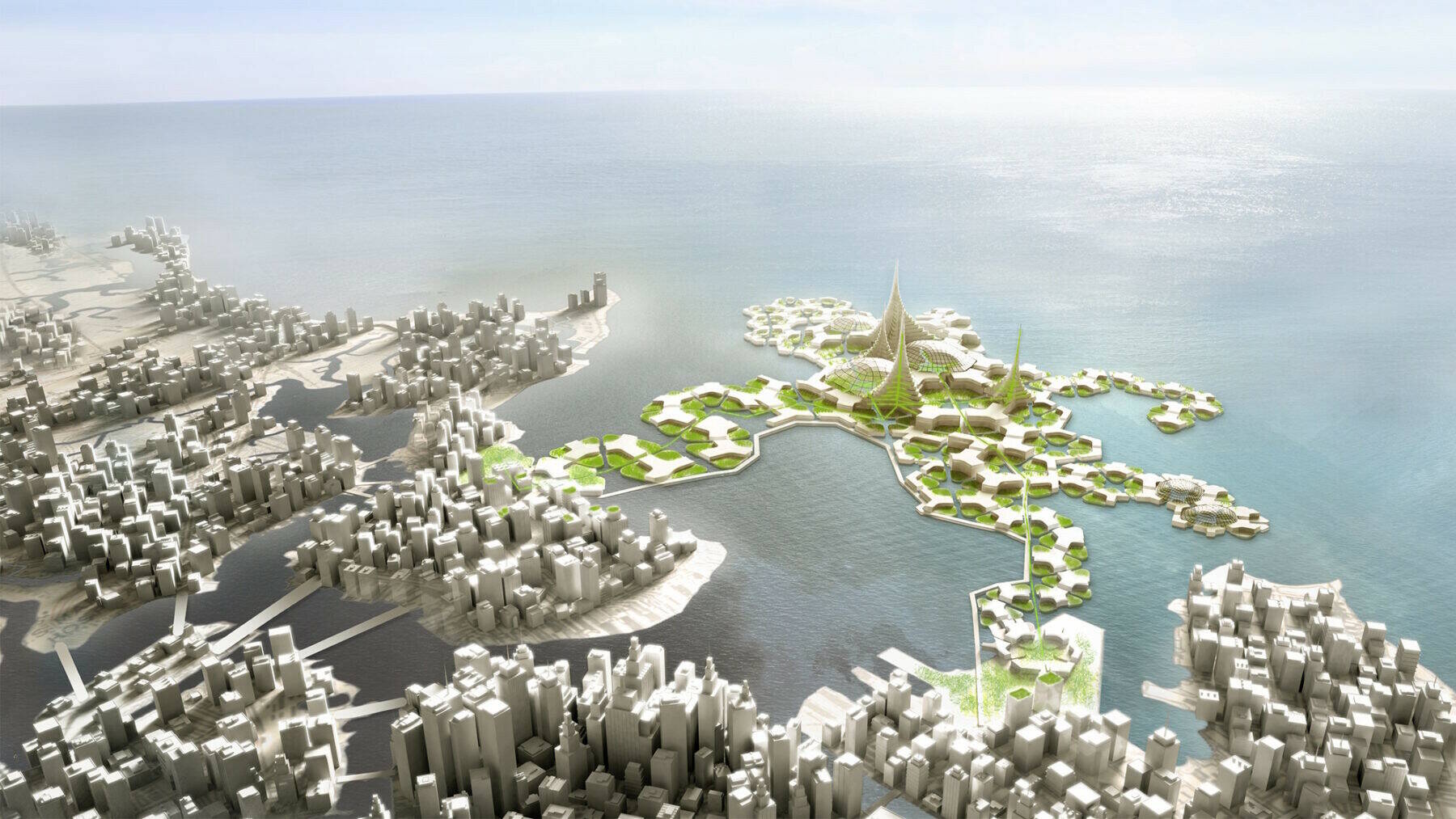
Already many cities situated in coastal areas are vulnerable to sea level rise and at the same time, they have a scarcity of space. Extreme weather events may give rise to high or low water levels in rivers and more space is consequently needed to accommodate big water flows or to store water for periods of drought. In the Netherlands (but also in other deltas around the world) the space for housing and industry is becoming limited due to these developments.
For centuries the motto of the Dutch approach to water safety has been “Luctor et Emergo”, “I struggle and emerge”. This new project aims to take the next step: “I struggle, emerge and… float!”
The Floating Future project is investigating the possibilities of large-scale floating developments as a possible addition to the present-day toolbox of coastal engineering. Floating settlements provide space and at the same time, the water can be used for other purposes. A floating foundation adapts to the changing water level, making it resilient to sea level rise, and can be relocated if needed.
The Space@Sea project received funding from the European Union's Horizon 2020 research and innovation programme under grant agreement No 774253.
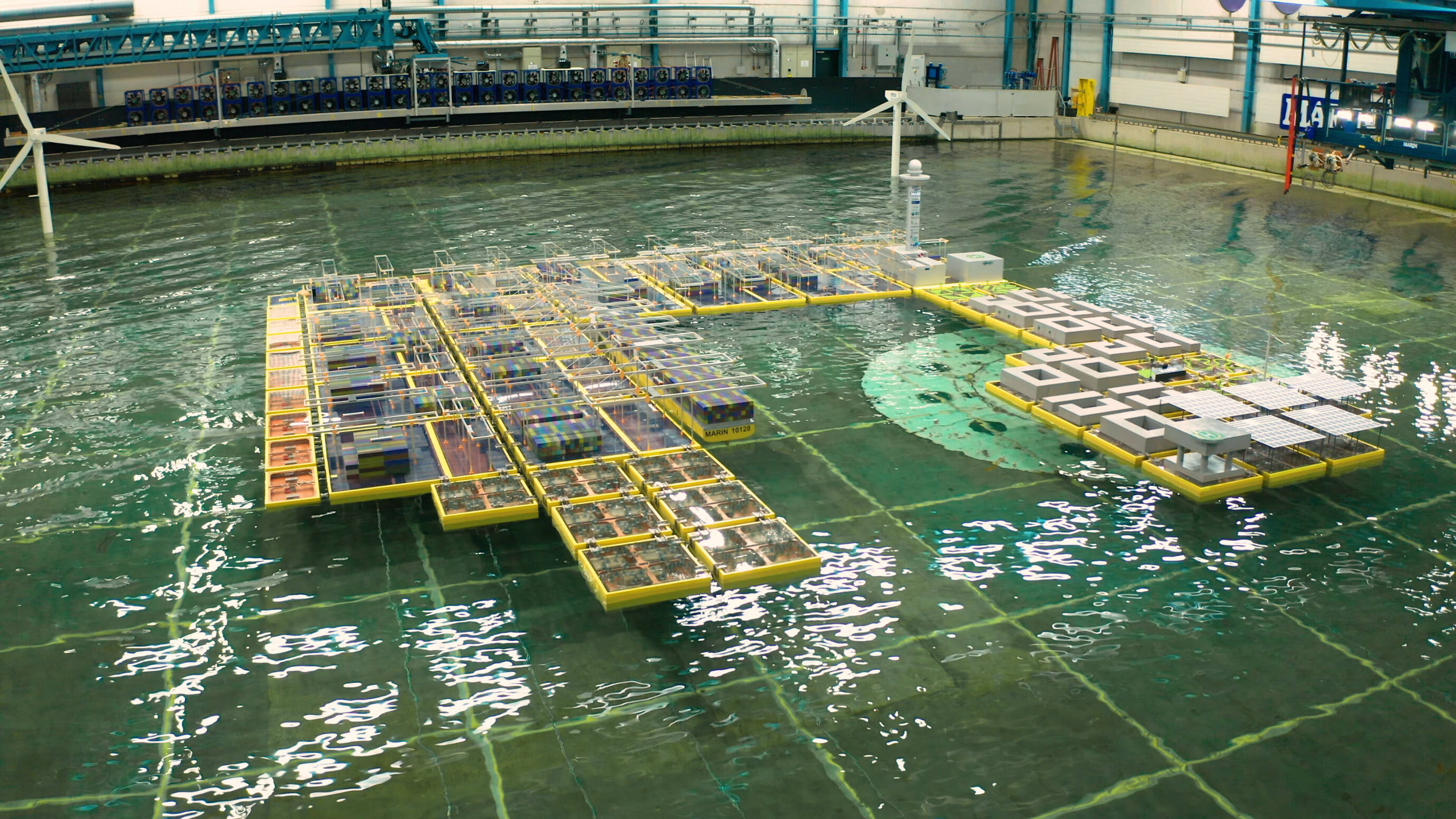
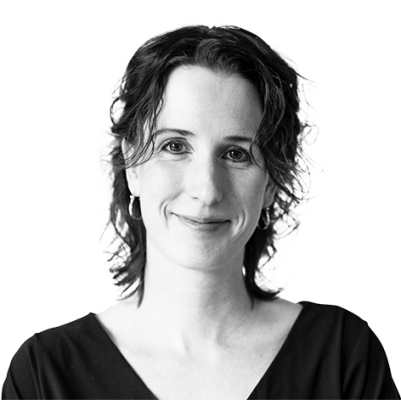
Work Package 1: Governance
“To create sustainable, inclusive, and a multifunctional living space on water, insight is required into the societal acceptance of large-scale floating concepts and the governance challenges related to upscaling. The first project that is part of WP 1 is therefore studying the social value of floating communities, and how citizens can be enabled, motivated and mobilised to participate in these developments. Arts-based, co-creation methods will be used to develop and visualise shared narratives on floating futures. The second project zooms in on the economic value of floating concepts, focusing on the development of sustainable business models for floating ports. To this end, soft systems methodology and Multi-Actor Multi-Criteria Analysis will be used. The third project focuses on the legal embodiment of large-scale floating structures and studies the rules and regulations that are required to incorporate floating objects into the existing legal system. Together, the three projects will develop novel floating urban and port concepts, and propose social, economic and legal conditions and principles for the future governance arrangements of large-scale floating structures.”

Margo
van den Brink
Associate Professor in Planning and Water at University of Groningen

Both technical and societal breakthroughs are required to achieve the upscaling of floating infrastructure. A technical breakthrough is needed to come up with an offshore engineering solution capable of withstanding environmental conditions and providing floating space with minimal ecological impact. Societal breakthroughs are needed to create governance arrangements for floating islands in inland water and coastal areas, and for societal acceptance of living and working on water.
The work will be divided in three clusters addressing governance, technology and ecology which relate to interdisciplinary questions. Researchers will collaborate with experienced societal partners to tackle the challenges. As well as scientific output, this will deliver an integrated vision, policy guidelines, design guidelines, project proposals and an inventory of the required resources and milestones to implement the Floating Future in the Dutch delta. Consequently, this project will deliver key insights into the required governance, financial and economic capabilities to realise climate-proof floating islands.
In the next few months, we are starting up and the actual kick-off will be in January 2024. MARIN will be involved in the technical evaluation of large floating structures and we will also use the new Seven Ocean Simulator centre to let people experience how it is to live and work on the water. We are looking forward to a very inspiring project with the consortium!
Interested to receive updates on the Floating Future project? Please contact us!
40 stakeholders
This unique project is supported by more than 40 stakeholder organisations in the public and private domain and combines interdisciplinary research with industry and societal partners. With this project we are literally building a knowledge base below the large-scale floating developments of the future. The core of the project is founded on 10 PhD assignments which will study the possibility of floating settlements from the perspective of different disciplines. These disciplines vary from social sciences to economic viability, from legal to technology and from coastal safety to ecology.
We already see an increase in the number of floating houses in the Netherlands. The next step would be to go from single houses to housing blocks, public spaces (like parks) and floating industry and ports. The Floating Future project was awarded a 5.3 million euro subsidy by the NWO-ORC2022 programme to research the upscaling of floating developments.


Rutger de Graaf
Co-founder and chairman Blue Revolution Foundation, entrepreneur and researcher in climate resilient floating developments
Work Package 4: Action Research
“Participatory Action Research (PAR) (WP 4) is the unique central ‘integration engine’ of Floating Future where the scientific disciplines Governance (WP 1), Technology (WP 2) and Ecology (WP 3) and the societal stakeholders come together to co-create innovative knowledge with the researchers. PAR is a method not only to advance scientific knowledge with societal stakeholders, but also to achieve practical objectives such as improving practice. In Floating Future this is done by participating in concrete case studies around the three study focus areas of the research: Inland, Coastal port city and Offshore. One of the Action Research methods that is applied in Floating Future is Climate Café, a unique and proven method for collaborative learning and co-creation at exciting case study field locations. Other WP 4 co-creation instruments include governance thinktank meetings, interactive design workshops, VR simulations and investors’ roundtables.”
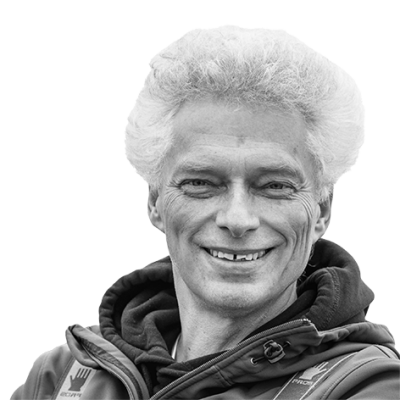

Tjeerd Bouma
Professor Bio geomorphological ecology of estuaries, deltas and Coasts at Utrecht University
Work Package 3: Ecology
“Large floating structures will not only cause shading, but will also affect water mixing by currents and waves, resuspension of fine sediment and many other factors. Additionally, such structures will become potential habitat or organisms that settle on hard substrate, which eat phytoplankton and use nutrients, thereby affecting a more extensive area around the structure. The ecological effects are hence extremely hard to predict, especially because the magnitude of these effects depend on the scale of the floating structure relative to the size and other specific characteristics of the receiving waterbody. Beyond potential negative impacts on the environment, there may also be opportunities to create positive impacts, by making biodiversity-enhancing designs of the edge of the islands (both above and below water) and utilising specific areas for economic activities such as aquaculture, that may also have favourable effects on biodiversity. We will develop design rules to maximise floating space in an environmentally friendly way. The design rules will include how to scale floating structures relative to the receiving system (PhD 3.1), how to create biodiversity-supporting island edges (PhD 3.2), and how to spatially integrate the cultivation of seaweeds (PhD 3.3).”
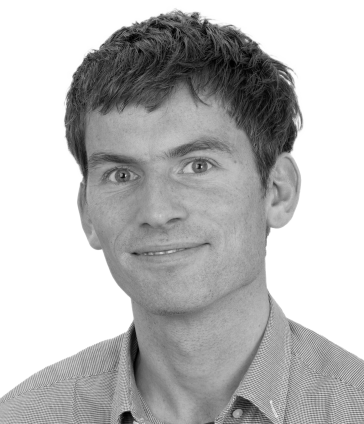
Work Package 2: Technology
“The forces and motions of extremely large structures in waves will be studied. The challenge is to find designs that lead to acceptable forces and motions in open water environments. This will be studied for inland as well as offshore environments, scaling up the engineering complexity from smaller scale developments to large floaters at sea.
On the other hand, there is also the effect that these very large structures have on the local wave climate and coastal processes. It will be interesting to see if floating structures can play a role in coastal flood safety. This also links to the ecology work package where we will investigate the effects of wave and light shielding on biodiversity and opportunities for aquaculture. Finally, for city developments it is likely that floating parts will be added to existing cities. We will research the architecture and urban design methods needed to enable the floating part to become an integrated part of the city through case studies in Rotterdam and Amsterdam.”

Olaf Waals
Manager Offshore
at MARIN



More info




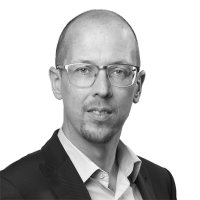

Rutger de Graaf
Co-founder and chairman Blue Revolution Foundation, entrepreneur and researcher in climate resilient floating developments
Work Package 4: Action Research
“Participatory Action Research (PAR) (WP 4) is the unique central ‘integration engine’ of Floating Future where the scientific disciplines Governance (WP 1), Technology (WP 2) and Ecology (WP 3) and the societal stakeholders come together to co-create innovative knowledge with the researchers. PAR is a method not only to advance scientific knowledge with societal stakeholders, but also to achieve practical objectives such as improving practice. In Floating Future this is done by participating in concrete case studies around the three study focus areas of the research: Inland, Coastal port city and Offshore. One of the Action Research methods that is applied in Floating Future is Climate Café, a unique and proven method for collaborative learning and co-creation at exciting case study field locations. Other WP 4 co-creation instruments include governance thinktank meetings, interactive design workshops, VR simulations and investors’ roundtables.”
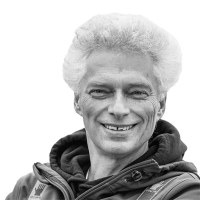

Tjeerd Bouma
Professor Bio geomorphological ecology of estuaries, deltas and Coasts at Utrecht University
Work Package 3: Ecology
“Large floating structures will not only cause shading, but will also affect water mixing by currents and waves, resuspension of fine sediment and many other factors. Additionally, such structures will become potential habitat or organisms that settle on hard substrate, which eat phytoplankton and use nutrients, thereby affecting a more extensive area around the structure. The ecological effects are hence extremely hard to predict, especially because the magnitude of these effects depend on the scale of the floating structure relative to the size and other specific characteristics of the receiving waterbody. Beyond potential negative impacts on the environment, there may also be opportunities to create positive impacts, by making biodiversity-enhancing designs of the edge of the islands (both above and below water) and utilising specific areas for economic activities such as aquaculture, that may also have favourable effects on biodiversity. We will develop design rules to maximise floating space in an environmentally friendly way. The design rules will include how to scale floating structures relative to the receiving system (PhD 3.1), how to create biodiversity-supporting island edges (PhD 3.2), and how to spatially integrate the cultivation of seaweeds (PhD 3.3).”

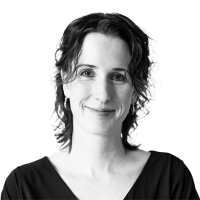
Work Package 1: Governance
“To create sustainable, inclusive, and a multifunctional living space on water, insight is required into the societal acceptance of large-scale floating concepts and the governance challenges related to upscaling. The first project that is part of WP 1 is therefore studying the social value of floating communities, and how citizens can be enabled, motivated and mobilised to participate in these developments. Arts-based, co-creation methods will be used to develop and visualise shared narratives on floating futures. The second project zooms in on the economic value of floating concepts, focusing on the development of sustainable business models for floating ports. To this end, soft systems methodology and Multi-Actor Multi-Criteria Analysis will be used. The third project focuses on the legal embodiment of large-scale floating structures and studies the rules and regulations that are required to incorporate floating objects into the existing legal system. Together, the three projects will develop novel floating urban and port concepts, and propose social, economic and legal conditions and principles for the future governance arrangements of large-scale floating structures.”
Margo van den Brink
Associate Professor in Planning and Water at University of Groningen
Both technical and societal breakthroughs are required to achieve the upscaling of floating infrastructure. A technical breakthrough is needed to come up with an offshore engineering solution capable of withstanding environmental conditions and providing floating space with minimal ecological impact. Societal breakthroughs are needed to create governance arrangements for floating islands in inland water and coastal areas, and for societal acceptance of living and working on water.
The work will be divided in three clusters addressing governance, technology and ecology which relate to interdisciplinary questions. Researchers will collaborate with experienced societal partners to tackle the challenges. As well as scientific output, this will deliver an integrated vision, policy guidelines, design guidelines, project proposals and an inventory of the required resources and milestones to implement the Floating Future in the Dutch delta. Consequently, this project will deliver key insights into the required governance, financial and economic capabilities to realise climate-proof floating islands.
In the next few months, we are starting up and the actual kick-off will be in January 2024. MARIN will be involved in the technical evaluation of large floating structures and we will also use the new Seven Ocean Simulator centre to let people experience how it is to live and work on the water. We are looking forward to a very inspiring project with the consortium!
Interested to receive updates on the Floating Future project? Please contact us!
Dialogue Board Floating Future
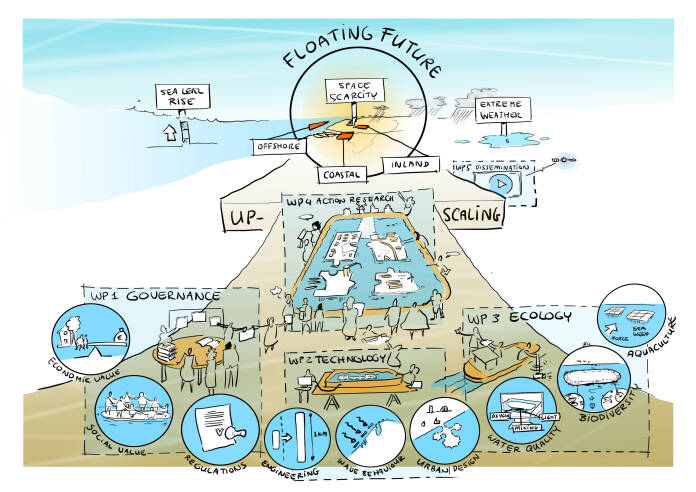
40 stakeholders
This unique project is supported by more than 40 stakeholder organisations in the public and private domain and combines interdisciplinary research with industry and societal partners. With this project we are literally building a knowledge base below the large-scale floating developments of the future. The core of the project is founded on 10 PhD assignments which will study the possibility of floating settlements from the perspective of different disciplines. These disciplines vary from social sciences to economic viability, from legal to technology and from coastal safety to ecology.
We already see an increase in the number of floating houses in the Netherlands. The next step would be to go from single houses to housing blocks, public spaces (like parks) and floating industry and ports. The Floating Future project was awarded a 5.3 million euro subsidy by the NWO-ORC2022 programme to research the upscaling of floating developments.
The Space@Sea project received funding from the European Union's Horizon 2020 research and innovation programme under grant agreement No 774253.
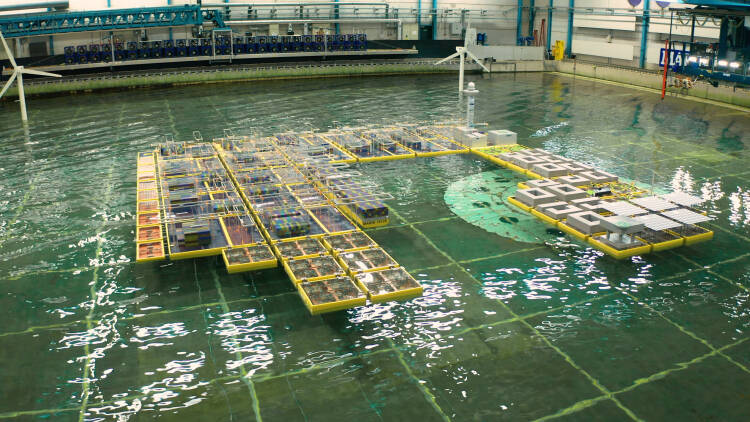
October2023, no. 137
Report
For centuries the motto of the Dutch approach to water safety has been “Luctor et Emergo”, “I struggle and emerge”. This new project aims to take the next step: “I struggle, emerge and… float!”
The Floating Future project is investigating the possibilities of large-scale floating developments as a possible addition to the present-day toolbox of coastal engineering. Floating settlements provide space and at the same time, the water can be used for other purposes. A floating foundation adapts to the changing water level, making it resilient to sea level rise, and can be relocated if needed.
Already many cities situated in coastal areas are vulnerable to sea level rise and at the same time, they have a scarcity of space. Extreme weather events may give rise to high or low water levels in rivers and more space is consequently needed to accommodate big water flows or to store water for periods of drought. In the Netherlands (but also in other deltas around the world) the space for housing and industry is becoming limited due to these developments.
Together with a group of partners, we have initiated the Floating Future project to better understand the pros and cons of developing floating cities and infrastructure at a larger scale.



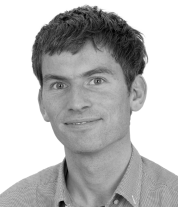
Work Package 2: Technology
“The forces and motions of extremely large structures in waves will be studied. The challenge is to find designs that lead to acceptable forces and motions in open water environments. This will be studied for inland as well as offshore environments, scaling up the engineering complexity from smaller scale developments to large floaters at sea.
On the other hand, there is also the effect that these very large structures have on the local wave climate and coastal processes. It will be interesting to see if floating structures can play a role in coastal flood safety. This also links to the ecology work package where we will investigate the effects of wave and light shielding on biodiversity and opportunities for aquaculture. Finally, for city developments it is likely that floating parts will be added to existing cities. We will research the architecture and urban design methods needed to enable the floating part to become an integrated part of the city through case studies in Rotterdam and Amsterdam.”

Olaf Waals
Manager Offshore
at MARIN

